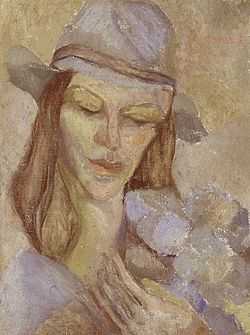Moya Dyring

Moya Dyring (10 February 1909 - 4 January 1967) was an Australian artist. She was one of the first women artists to exhibit cubist painting in Melbourne.[1]
Moya Clare Drying was born in Coburg, Victoria in 1909, the third child of Carl Peter Wilhelm Dyring, medical practitioner, and his second wife Dagmar Alexandra Esther, née Cohn, both Victorian born. The family moved to Brighton in 1920. Moya was educated (1917–27) at Firbank Church of England Girls' Grammar School, Brighton. After visiting Paris in 1928, she studied at the National Gallery of Victoria Art School, Melbourne from 1929 to 1932.[2] where she met her future husband Sam Atyeo. After NGV, Moya studied under George Bell in the Bourke Street Studio School in Melbourne, who and Sam Atyeo, encouraged her to experiment with modernism. Sunday Reed also studied at Bell's School at the time.
For several months in 1937 she took charge of Heide, the home and garden of the art patrons John and Sunday Reed, at Bulleen, a suburb of Melbourne.[2] Dyring's husband, Sam Atyeo, had an affair with Sunday Reed and later Dyring had an affair with Sunday's husband John.[3] She had a successful solo exhibition at Riddell Gallery in Melbourne in June 1937.
In August 1937, Dying embarked for Panama, then travelled to New York. She disliked the work of contemporary American artists and sailed for France. In 1938 she was based in Paris, taking advantage of Atyeo's contacts within the avant-garde. She studied at the Académie Colarossi, the Académie de la Grande Chaumière and with Andre Lhote.
In 1939, she and Atyeo set up house on a farm in Vence, France. Atyeo accepted a commission in Domenica, and left Dyring in Vence. At the outbreak of war she was evacuated back to Australia. She travelled to Dominica where she married Atyeo. However, they were not happy and divorced in 1950. She returned to Australia every three years until 1963.
Two of her earliest works, Melanctha, 1934, a small cubist work, and Portrait of Sunday Reed, 1934, are part of the permanent collection at the Heide Museum of Modern Art. She is also represented in the National Gallery of Australia, Canberra.
References
- ↑ "Moya Dyring". Eva Breuer: art dealer. Retrieved 2008-07-10.
- ↑ 2.0 2.1 Peers, Juliet (1996). "Dyring, Moya Claire (1909 - 1967)". Australian Dictionary of Biography. Canberra: Australian National University. Retrieved 2008-07-10.
- ↑ Wyndham, Susan (2004-10-02). "Creative heart". Sydney Morning Herald. Retrieved 2008-07-10.
External links
- Peers, Juliet (1996). "Dyring, Moya Claire (1909 - 1967)". Australian Dictionary of Biography. Canberra: Australian National University. Retrieved 2008-07-10.